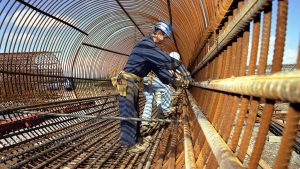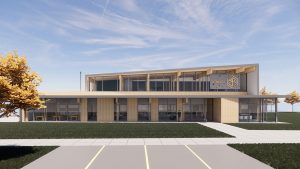Residents in Goderich, Ont. are protesting the merit of an energy storage demonstration project as it nears the final stages of local and environmental approvals.
But a representative of the project’s developer said concerns should dissolve once greater community discussion takes place.
"It’s just something that’s new and different," said Katherine Peretick, NRStor Inc. director of engineering about her company’s proposal to store power in a former salt mine. "We want a productive dialogue here where everybody is talking about the facts and we want to get the facts out there as much as we can."
NRStor plans to store enough power to generate 1.75 megawatts for a four-hour duration — enough to supply 1,000 homes. The Toronto company has a 10-year contract with the Ontario Independent Electricity System Operator to store excess power from the province’s electrical grid.
Peretick described the project as the world’s first fuel-free compressed air energy storage system to operate commercially.
Compressed air energy storage systems warehouse energy by compressing and storing ambient air in an airtight vessel. To return the energy to the grid, the systems reheat and release the pressurized air in an expansion turbine that in turn drives a generator.
Two very large systems, located in Germany and Alabama, use natural gas to generate the heat. The technology NRStor will use harvests heat from compression.
"So we can do it (regenerate power) with no additional fuel, no natural gas, no air emissions, no dependency on any type of fossil fuels," Peretick said.
The entire system’s round trip efficiency, its ability to retain the energy pulled from the grid, is around 60 per cent.
Hydrostor Inc. developed the heat harvesting process and uses a "phase-change" material to collect and release the heat.
"It’s like a candle wax," Peretick said. "When it gets hot it melts and then when you take energy back out of it, it resolidifies."
The heat will be stored above ground in tanks using Hydrostor’s proprietary thermal storage technology. Hydrostor is managing the Goderich project’s engineering, procurement and construction.
Peretick declined to share costs. Because it’s a demonstration project, the expenses involved won’t accurately reflect the costs of future scaled-up systems, she said.
Salt caverns are often used to store natural gas. Salt will "self-heal any minuscule cracks that develop because it actually flows just a very small amount," Peretick said.
Andrew McGillis, vice-president engineering and projects for Hydrostor, said the Goderich project will involve repurposing the salt mine to store air and erecting a 60-by-40-foot building to house the compressor and turbine.
Repurposing the mine will involve removing some of the remaining brine to make room for the air. Miners use water to create an easily removable salt solution. Little work is needed to adjust the well casing and piping for its new purpose, McGillis said. Some of the wellhead valving will need changes.
"But it’s all still to the same standards; it’s still regulated by the same provincial agency," he said.
Hydrostor launched the search for a general contractor in mid-April.
Changes to the well and wellhead valving will take place this summer, McGillis said.
They’ll break ground on the building early fall and he anticipated work would wrap up by the first or second quarter of 2018 to allow for time for commissioning.
The project is slated to begin commercial operation in May 2018.
Meanwhile, Stan Spacek, a local doctor, is petitioning local politicians and the Ontario minister of energy to halt to the project.
So far, according to the petition’s website, he has collected 242 signatures.
The petition asserts that because the plant generates power it should have been cancelled when the province axed green energy projects last fall. The petition further claims the project won’t benefit the community beyond its construction phase and encroaches on the home of an endangered species.
The validity of the technology is also challenged.
Many comments accompanying the petition outline concerns about an industrial project taking place so close to a residential area.
Spacek did not respond to a Daily Commercial News request for an interview.
Peretick said NRStor is in the final stages of completing its environmental study.
"We are aware of the sensitive species in the area and will do everything we can to make sure we don’t disturb these habitats," she said.
The company appears before Goderich council today (April 24) to obtain approval of its site plan.
Matt Roberts, executive director of the U.S. based Energy Storage Association, said the technology is proven and more compressed air storage systems are in the works in the United States.
He noted the process has few environmental impacts. No chemicals are added.
"So even if it were to ‘spring a leak,’ you would just have some high pressure air popping up out of the ground," he said.
Peretick said the need for energy storage is growing and compressed air energy storage is particularly helpful in integrating renewable energy with the grid.
NRStor hopes to deploy the technology in other areas of southwestern Ontario, she said.










Recent Comments
comments for this post are closed